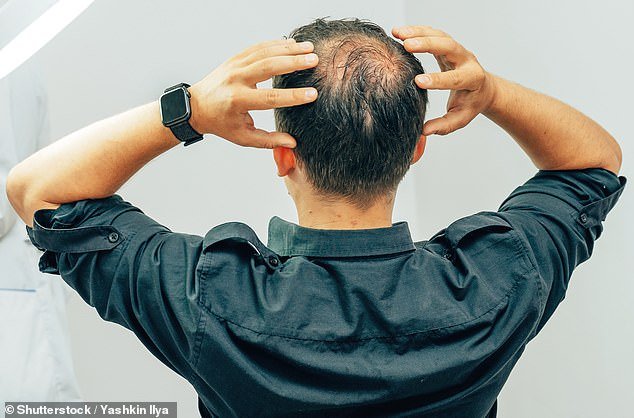GP says it’s NOT your mother’s fault if you start balding in your 30s…
>
If your mother’s father goes bald, you will too. That is how the old wives’ tale has been told to men for decades.
But it’s not true, according to one GP.
Dr Sameer Sanghvi, of Lloyds online pharmacy, is now telling men: ‘It’s time to stop blaming your mum for your baldness.
‘The notion that your mother’s genes are responsible for your baldness is a myth.
GP Dr Sameer Sanghvi says that while family history of baldness is ‘the most decisive risk factor’ in determining your own fate, it can come from either your mother or father’s side (file photo)
‘But it’s a fallacy that many believe.’
He accepted a family history of baldness is ‘the most decisive risk factor’ in determining your own fate.
But Dr Sanghvi said it’s ‘only fair to blame both of your parents’, adding: ‘It can come from either your mother or father’s side.
‘Your chances of losing your hair are determined by a complex combination of genes that can be passed on from both parents.’
Other examples of characteristics influenced by multiple genes (polygenic) are skin colour and height.
Although experts insist mother’s genes aren’t to blame, the science on the topic isn’t as clear-cut.
For one analysis, in 2017, concluded the statement was accurate.
Edinburgh University researchers looked at 52,000 males aged between 40 and 69 who were participants of the UK Biobank database.
They found that 80 per cent of male pattern baldness is passed down in our genes.
The study suggested that men can mainly blame their mothers, and not their fathers, as most of the genetic signals come from the X chromosome inherited through the female line.
Male-pattern baldness, the name for androgenetic alopecia in men, is the most common type of hair loss.
It affects 6.5million men in the UK and more than 50million in the US, data suggests.
It typically starts with thinning of the hair at the temples and top of the head, or a receding hairline.
This is followed by more substantial hair loss, exposing the scalp, according to the NHS.
Some men affected by male pattern baldness begin to lose their hair in their late teens, while for others the process begins much later. Most men will have lost some hair by the age of 60, experts say.
And scientists have suggested that that people likely lose their hair as the concentration of sex hormone dihydrotestosterone (DHT) increases in the tissue on their heads.


Celebrities like Elton John and chef Gordon Ramsay have undergone hair transplants to hang on to their youth after thinning on top

Male-pattern baldness is the most common type of hair loss, affecting 6.5 million men in the UK and more than 50 million in the US
DHT interferes with the hair’s growth cycle and causes follicles to thin and eventually fall out, but experts don’t yet know why the hormone has this effect.
Hairs last about two to three years on your head, then fall out and are replaced with new ones.
Around 90% of your hairs are growing at any one time, with 10% in a ‘resting phase’. Every few months, the ‘resting’ follicles fall out and new hairs grow in their place.
The NHS says you can lose anywhere between 50 and 100 hairs a day, but when thinner hairs, or none at all, grow back in their place, balding occurs.
Male patterned baldness is permanent but can be treated with medicines Finasteride and minoxidil, steroid injections or creams, immunotherapy or light therapy.
Other forms of treatment can include wigs made out of synthetic or real hair, tattooing to give the illusion of hair or hair transplants.
Celebrities like Elton John and chef Gordon Ramsay have undergone hair transplants to hang on to their youth after thinning on top.
Other medical causes of baldness, such as cancer, weight loss or iron deficiency, are temporary.
